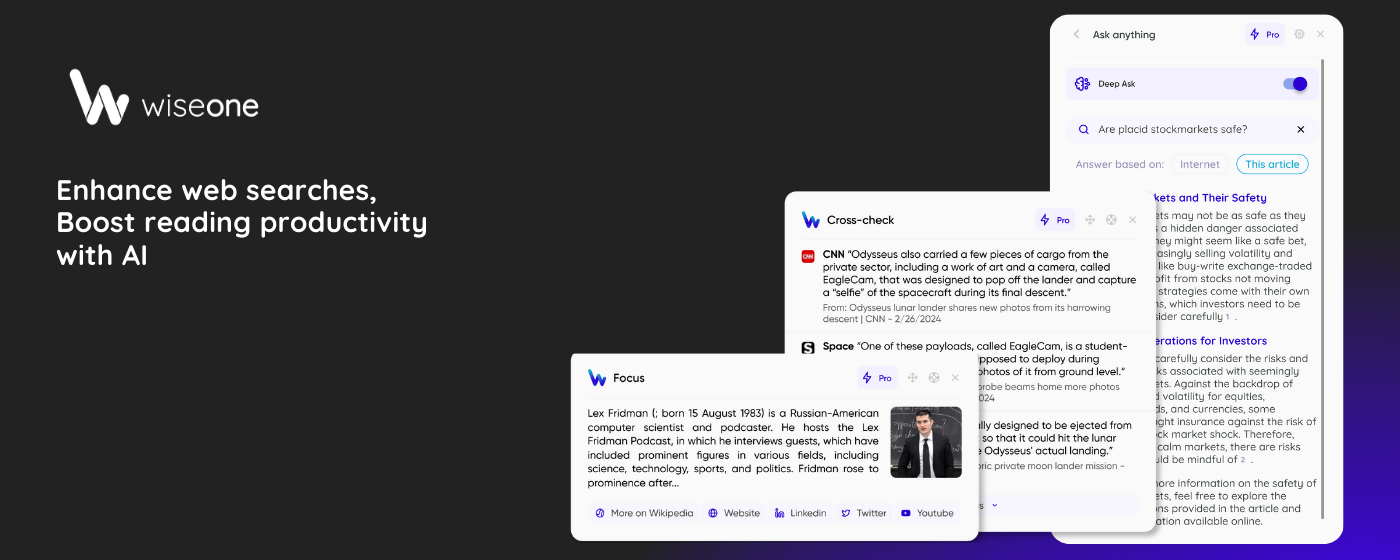How to enhance knowledge about everything

Introduction
Knowledge is a fundamental resource that is vital in various aspects of life. Its importance spans personal development, social awareness, innovation, and organizational success. Understanding the multifaceted benefits of knowledge can provide insight into why it is a powerful way to progress.
Understanding the value of knowledge
Knowledge is also practical in everyday life, embodying the understanding or familiarity gained through experience or study. Knowledge's value spans various dimensions, influencing individual lives and societal progress.
Philosophers have long debated the value and nature of knowledge. According to mainstream epistemology, knowledge can be categorized into knowledge-that (propositional) and knowledge-how (practical wisdom).
These distinctions are crucial as they suggest that knowing how to perform a task differs from learning facts about it. Gilbert Ryle notably discussed this separation, highlighting a deeper exploration into the epistemic standings that knowledge can embody.
Ryle argued that knowledge relates to a proposition involving the apprehension of truths or facts. People typically refer to this type of knowledge when they discuss facts, such as knowing that the Earth orbits the Sun.
On the other hand, practical knowledge, or knowledge-how, relates to the ability to perform specific tasks. Examples include knowing how to ride a bicycle, swim, or play an instrument. This type of knowledge is typically implicit, demonstrated through action rather than articulated in factual statements. It involves skills and competencies acquired through practice and experience rather than theoretical understanding.
Economic and Societal Implications of Knowledge
In the economic context, Friedrich Hayek emphasized the importance of knowledge in society, particularly how it helps efficiently coordinate and utilize resources. Hayek's insights suggest that knowledge is not just an individual asset but a dispersed entity that plays a critical role in societal organization and economic systems.
Personal Development and Knowledge
Knowledge contributes significantly to personal development. It helps individuals improve self-awareness, build skills, increase self-esteem, and achieve personal and professional goals. This form of development is viewed as a broader aspect of one's life, influencing not just career paths but also personal growth and well-being.
How to enhance knowledge about everything
Set clear goals
Setting clear learning goals guides the journey to gaining knowledge. Without defined goals, acquiring knowledge can lack direction and purpose.
Goals provide a clear focus, helping you prioritize what you want to learn and why. They structure your learning efforts and can be tailored to your interests, whether you're enhancing your knowledge base, acquiring new skills, or staying updated on specific topics.
By articulating your objectives, you establish a roadmap that propels you forward, motivates your learning endeavors, and increases your commitment to the process.
For instance, set a goal to learn a new programming language within a specific timeframe or deepen your understanding of global politics by reading several weekly articles.
Another example could be improving your communication skills by taking a public speaking course. Establishing concrete, measurable, and achievable goals creates a tangible framework for your learning endeavors and enables you to track your progress.
Taking advantage of dedicated tools
As AI continues gaining popularity, leveraging AI tools becomes crucial for enhancing knowledge and learning new skills.
Among these tools lies Wiseone, an innovative AI tool that transforms how we read and search for information online.

Wiseone enhances knowledge by providing extensive features designed with the best LLMs available today.
Here's how it happens:
- Direct Query Answers: You can type queries on search engines and receive comprehensive answers directly. The answers provided include references to the sources, allowing easy access for further exploration.
- Summarization: Wiseone's "Summarize" feature allows you to understand the main points of an article or a PDF document efficiently without the need to read the entire piece by generating thorough summaries with key takeaways.
- Cross-Referencing: With cross-checking, Wiseone simplifies fact-checking and quick access to credible information by generating curated lists of news articles reporting on the same topic.
- Effortless Information Access: The "Explore feature" provides quick access to related topics, enabling users to gain deeper insights into any subject matter.
- Explaining complex words: Wiseone ensures a thorough understanding of words to comprehend 100% of the content, mainly complex terms and concepts, with the feature "focus."
Cultivate curiosity
Curiosity is a strong desire to know or learn, having an interest in a person, thing, or experience that leads to inquiring. Here's how to cultivate it:
- Identify motivations
The first step in enhancing curiosity is to know and understand what motivates you. Recognizing what intrigues an individual can help guide your curious impulses more constructively. - Sense of Wonder
This involves seeing things as if for the first time, even ordinary or familiar situations. By adopting a mentality that appreciates everyday life, you can maintain a continual interest in exploring and understanding your environment. - Ask More Questions
Asking questions is a direct and effective method for enhancing curiosity. It increases knowledge and encourages more profound engagement with topics of interest. Whether asking follow-up questions or challenging the basis of what you know, questioning helps build a more comprehensive understanding of any subject. - Engage with Diverse Experiences
To broaden your horizons and enhance your curiosity, seek new and diverse experiences. This could involve reading broadly, traveling, attending workshops, or simply conversing with people whose views and backgrounds differ from yours. Each new experience is an opportunity to learn and become curious about different aspects of the world.
Use Diverse Knowledge Channels
Diversity in learning channels refers to methods, platforms, and tools through which education and training can be delivered to students or employees. These channels can include traditional classroom settings, online platforms, blended learning environments, and multichannel multimodal learning (MML) approaches.
Formal education provides a structured framework for learning because it equips students with knowledge, critical thinking skills, and academic credentials crucial for personal and professional advancement.
However, nowadays, modern learning resources have changed by providing access to information and empowering self-learners.
Now, multiple online platforms offer various courses in different subjects, allowing people to learn at their own pace, anytime, anywhere.
Another form of learning that has also become popular is podcasts, which offer:
- Immersive learning experiences.
- Engaging in discussions.
- Interviews with diverse and exciting people.
- Expert insights.
Educational apps have also become known for leveraging technology and AI to provide interactive learning experiences, challenges, and personalized feedback, making knowledge accessible, easy to have, and enjoyable.
Embrace Effective Learning Strategies
Adopting effective learning strategies is also essential to enhancing knowledge and learning new information. Active learning techniques like active recall, spaced repetition, and concept mapping improve retention and understanding.
- Active recall involves retrieving information from memory rather than passively reviewing material, reinforcing neural connections, and strengthening recall.
- On the other hand, spaced repetition involves revisiting information at increasing intervals over time, optimizing long-term retention by leveraging the spacing effect.
- A concept map visually displays the relationships between different concepts, ideas, and pieces of information. Concept maps are hierarchical, with one main idea or focus question and several subtopics, key concepts, and related ideas.
Incorporating these active learning strategies into our study routines allows us to maximize our cognitive efficiency and accelerate learning.
Moreover, understanding and tailoring learning styles to individual preferences can significantly enhance learning outcomes.
Learning styles
Auditory Learning Style
Auditory learners learn best through their sense of hearing. This means they remember and understand new concepts better when they are explained out loud—even if they’re speaking themselves. They can even better retain knowledge when new ideas are paired with nonverbal sounds such as music, drum beats, or clapping.
Visual Learning Style
Visual learners learn more when their sense of sight is engaged. They quickly show an affinity for books and reading, starting with picture books and promptly moving on to books with text. Bright colors and clear diagrams engage them, and they can learn from videos, demonstrations, and classroom handouts. Of the three different learning styles, visual learning most closely conforms to traditional classroom teaching methods. Visual learners can glean information from reading assignments, from taking and reviewing handwritten notes, and from the flip charts, diagrams, and other visual aids that many teachers use.
Kinesthetic Learning Style
The most physical of all learning styles, kinesthetic learners absorb information best through touch, movement, and motion. The word kinesthetic refers to our ability to sense body position and movement. This means that to understand something, they need to touch, feel, and move it around.
Individuals can optimize their knowledge and study approaches to suit their unique strengths and preferences by identifying a preferred learning style and dedicating techniques that align with it.
Micro-learning
Micro-learning is based on scientific knowledge. It uses spaced retrieval, a well-proven method of boosting retention. It is achieved by breaking down learning topics into smaller bits that can be easily understood and repeating them with adequate spacing between lessons.
This learning technique gives learners retentive memory capabilities, making microlearning suitable for acquiring technical skills.
Some microlearning content examples include:
- Text (phrases, short paragraphs)
- Videos (of the short variety)
- Audio (short snippets of speech or music)
- Tests and Quizzes
- Games (e.g., simple single-screen challenges)
- Images (photos, illustrations)
Enhance knowledge from Experience and Real-Life Situations
Enhancing knowledge from experience and real-life situations is like refining raw material into a masterpiece.
While formal education provides the base and foundation, applying knowledge in real-world scenarios enriches our understanding. Whether through triumphs or challenges, every experience offers valuable lessons that cannot be learned from books alone.
Real-life situations challenge us to think critically, problem-solve creatively, and adapt to diverse circumstances, improving our skills and deepening our insights. T at work, traveling to a new country, or overcoming personal issues.
Overall, by actively seeking out new experiences and embracing the lessons they offer, we open ourselves up to a world of continuous learning and growth. After all, through the crucible of real-life experiences, knowledge transforms into wisdom, guiding us toward self-discovery and mastery.
FAQ
What is the value of knowledge?
The value of knowledge is multifaceted, encompassing philosophical debates, practical applications, and personal growth. Whether it enhances cognitive functions, enriches personal lives, or contributes to societal progress, knowledge remains important in human development and civilization.
How can we enhance knowledge about everything?
We can enhance knowledge by setting clear goals, taking advantage of dedicated tools, cultivating curiosity, using diverse knowledge channels, embracing effective learning solutions, micro-learning, and from experience and real-life situations.
What are the different learning styles?
Auditory Learning Style
Auditory learners learn best through their sense of hearing. This means they remember and understand new concepts better when they are explained out loud—even if they’re speaking themselves. They can even better retain knowledge when new ideas are paired with nonverbal sounds such as music, drum beats, or clapping.
Visual Learning Style
Visual learners learn more when their sense of sight is engaged. They quickly show an affinity for books and reading, starting with picture books and promptly moving on to books with text. Bright colors and clear diagrams engage them, and they can learn from videos, demonstrations, and classroom handouts. Of the three different learning styles, visual learning most closely conforms to traditional classroom teaching methods. Visual learners can glean information from reading assignments, from taking and reviewing handwritten notes, and from the flip charts, diagrams, and other visual aids that many teachers use.
Kinesthetic Learning Style
The most physical of all learning styles, kinesthetic learners absorb information best through touch, movement, and motion. The word kinesthetic refers to our ability to sense body position and movement. This means that to understand something, they need to touch, feel, and move it around.
What does microlearning include?
Some microlearning content examples include:
- Text (phrases, short paragraphs)
- Videos (of the short variety)
- Audio (short snippets of speech or music)
- Tests and Quizzes
- Games (e.g., simple single-screen challenges)
- Images (photos, illustrations)
What is Wiseone?
Wiseone is an innovative AI tool that transforms how we read and search for information online.
Wiseone enhances knowledge by providing extensive features designed with the best LLMs available today.
Enhance your web search,
Boost your reading productivity with Wiseone



